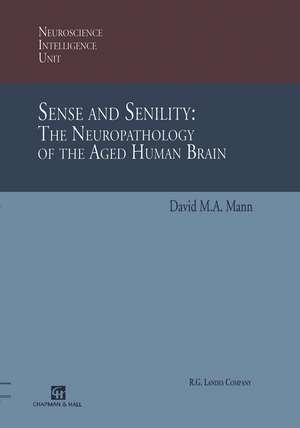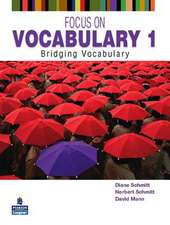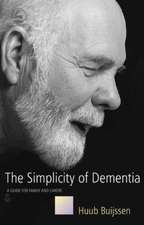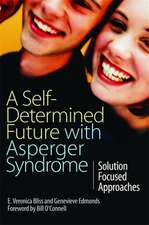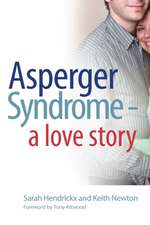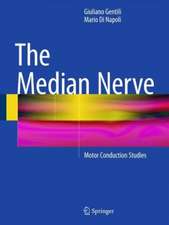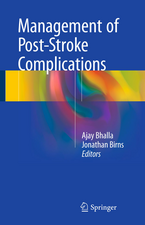Sense and Senility: The Neuropathology of the Aged Human Brain: The Neuropathology of the Aged Human Brain
Autor David M.A. Mannen Limba Engleză Paperback – 23 oct 2012
| Toate formatele și edițiile | Preț | Express |
|---|---|---|
| Paperback (1) | 1092.22 lei 6-8 săpt. | |
| Springer Us – 23 oct 2012 | 1092.22 lei 6-8 săpt. | |
| Hardback (1) | 1100.85 lei 6-8 săpt. | |
| Springer Us – 14 feb 1997 | 1100.85 lei 6-8 săpt. |
Preț: 1092.22 lei
Preț vechi: 1149.71 lei
-5% Nou
Puncte Express: 1638
Preț estimativ în valută:
209.02€ • 215.93$ • 173.96£
209.02€ • 215.93$ • 173.96£
Carte tipărită la comandă
Livrare economică 25 martie-08 aprilie
Preluare comenzi: 021 569.72.76
Specificații
ISBN-13: 9781461377498
ISBN-10: 1461377498
Pagini: 208
Ilustrații: V, 198 p.
Dimensiuni: 178 x 254 x 11 mm
Greutate: 0.37 kg
Ediția:Softcover reprint of the original 1st ed. 1997
Editura: Springer Us
Colecția Springer
Locul publicării:New York, NY, United States
ISBN-10: 1461377498
Pagini: 208
Ilustrații: V, 198 p.
Dimensiuni: 178 x 254 x 11 mm
Greutate: 0.37 kg
Ediția:Softcover reprint of the original 1st ed. 1997
Editura: Springer Us
Colecția Springer
Locul publicării:New York, NY, United States
Public țintă
ResearchDescriere
nly two things are certain in life, one is that all of us will inevita Obly grow older, the other is that at some point during or at the end of this process we shall die. Inherent to the passage of time is a deterio ration in the structural and functional integrity of our bodies, this pro gressing to such an extent that one or more organ systems will eventu ally begin to fail with the continued health and well-being of the individual coming under threat. Age-associated deficiencies in the musculo-skeletal, cardiovascular, or endocrine systems producing arthri tis, hypertension, stroke or diabetes are all too apparent in our elderly population yet internally caused failures in the function of the nervous system provide the common, and mostly intractable, problems of memory and intellect or locomotion that face and frustrate clinicians. Perhaps the most important factor which can decide the outcome of research studies professing to examine the effects of the passage of time (i. e. the 'process of aging') on the function of the nervous system, or indeed any other organ system, is the selection of appropriate or repre sentative subjects for investigation. The heart of this problem lies in defining what might be considered as 'normal' aging as distinct from age-associated disease; setting the 'goal posts of normality' continues to 1 be a matter of considerable debate.
Cuprins
1. Introduction.- 2. Pathological Changes in the Elderly Human Brain.- 2.0. Introduction.- 2.1. Gross Changes in the Brain.- 2.2. Nerve Cell Numbers in Aging.- 2.3. Regressive Changes in Neurones with Aging.- 2.4. Senile Plaques.- 2.5. Neurofibrillary Tangles.- 2.6. Lewy Bodies.- 2.7. Hirano Bodies.- 2.8. Granulovacuolar Degeneration.- 2.9. Neuropigments.- 2.10. Other Neuronal Changes.- 2.11. Changes in Glial Cells.- 2.12. Cerebrovascular Changes.- 2.13. Brain Aging: Compensation Versus Redundancy.- 3. Pathological Changes in Neurodegenerative Disease.- 3.1. Introduction.- 3.2. The Pathological Changes of Alzheimer’s Disease.- 3.3. The Initial Site of Damage.- 3.4. The Presence of Alzheimer-type Pathology in Situations Other than AD.- 3.5. The Pathogenesis of Alzheimer’s Disease.- 3.6. Systemic Changes in AD.- 3.7. The Pathological Changes of Parkinson’s Disease.- 4. Etiological Considerations.- 4.1. Genetic Factors.- 4.2. Environmental Factors.- 5. Relationships Between Aging and Neurodegenerative Disease.- 5.0. Introduction.- 5.1. Pathology in the Normal Elderly-Preclinical Disease?.- 5.2. Implications for Aging Research.- 5.3. The Concept of Normality.- 5.4. Relevance of Animal Studies.- 5.5. Aging and Disease—A Continuum.- 5.6. Genetic Susceptibility.- 5.7. Concluding Remarks.
